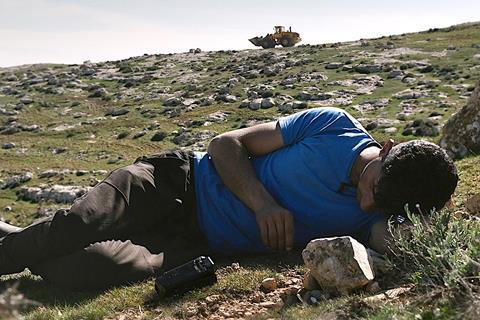A Palestinian-Israeli collective documents how a beleaguered West Bank community is resisting the Israeli army

Dir: Basel Adra, Hamdan Ballal, Yuval Abraham, Rachel Szor. Palestine/Norway. 2024. 96mins
Few films premiering in Berlin this year are likely to be as timely as No Other Land, a documentary that is particularly urgent and eye-opening in the context of the current Israeli-Palestinian conflict. Substantially made before the Hamas attacks of last October, and Israel’s subsequent continuing assault on Gaza, this reportage by a Palestinian-Israeli collective offers an insider view of a West Bank community resisting a programme of demolition by the Israeli army. No Other Land is bound to attract attention worldwide after premiering in Berlin’s Panorama section, where it is likely to be hotly discussed.
Urgent and eye-opening
The film incorporates some home video, notably childhood footage from co-director Basel Adra, as well as current and archive TV material – including images of an earlier visit to the West Bank by ex-British PM turned Middle East peace envoy Tony Blair. But for the most part, No Other Land was shot on video between summer 2019 and winter 2023 by its four directors, one of whom, Rachel Szor, is credited as DoP. The central figure and occasional voice-over narrator is Adra, a Palestinian former law student who grew up in Masafer Yatta, a West Bank community composed of several villages. Using family footage, he recalls his childhood there. The son of activists, he recalls the first time he saw his father, who runs a gas station, being arrested.
The film depicts Masafer Yatta under assault from the Israeli army, and sometimes from armed Israeli settlers. The order has been given – following 22 years of deliberation in an Israeli court – for villages in Masafer Yatta to be demolished and their inhabitants evicted to reclaim the land supposedly for a tank training base. Adra is determined to document and publicise the expulsion, so as to force the US to put pressure on Israel. His ally in this project is co-director Yuval Abraham, an Israeli journalist who makes himself a fixture in Masafer Yatta, despite scepticism from some locals: “So you’re a human rights Israeli?” one asks him sardonically.
Footage reveals a grim cyclical pattern. Israeli bulldozers move in on villages, destroying homes as well as buildings including an elementary school, even a chicken house. The residents rebuild, often by night, but the forces return and raze again, also confiscating building equipment. The demolition programme is supervised by an Israeli identified only as ‘Ilan’. Other measures taken include cutting off electricity and water and banning the use of cars. Matters come to a head when a villager, Harun Abu Aram, is shot by police and left paralysed, sparking demonstrations that themselves come under attack; his family has meanwhile moved into one of the area’s many caves.
Handheld cameras make for an often shocking immediacy, not least when those filming, including Adra himself, find themselves confronted by the authorities or by combative settlers who join in with the demolitions (the faces of some soldiers are digitally blurred). Occasional dialogue scenes feel at least partly staged: we see Adra and Abraham, sometimes on car journeys, voicing their fatigue as events continue, or wondering whether their work is having any real impact.
Abraham laments that few people read his reports, leading Adra to label him a privileged dilettante: “Like you want to end the occupation in ten days.” In another sequence, a man named Hamdan similarly confronts Abraham with his scepticism: this appears to be co-director Hamdan Ballal, which would make the moment look somewhat artificial. Nevertheless these scenes allow the film-makers to discuss what is at stake, and to appraise the progress and effect of their work.
Events begin to attract international media attention but the demolitions continue, with some villagers moving away, others staying put – including the woman whose lament “we have no other land” gives the documentary its title. A coda notes that the film proper was completed in October 2023, but we hear radio reports that Israel has begun its attack on Gaza. As the film ends, Masafer Yatta’s future remains unclear, but it is hard not to imagine that No Other Land will only be a prologue to further reports on the current Palestinian condition, by these film-makers or others.
Production companies: Yabayay Media, Antipode Films
International sales: Antipode Films mail@antipodefilms.com
Producers: Fabien Greenberg, Bård Kjøge Rønning, Basel Adra, Hamdan Ballal, Yuval Abraham, Rachel Szor
Cinematography: Rachel Szor
Editing: Basel Adra, Hamdan Ballal, Yuval Abraham, Rachel Szor
Music: Julius Pollux Rothlaender























